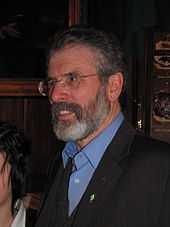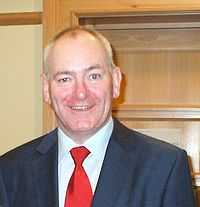United Kingdom general election, 2005 (Northern Ireland)
| | |||||||||||||||||||||||||||||||||||||||||||||||||||||||||||||||||||||||||||||||||||||||||||||||||||||||||||||||
| |||||||||||||||||||||||||||||||||||||||||||||||||||||||||||||||||||||||||||||||||||||||||||||||||||||||||||||||
| |||||||||||||||||||||||||||||||||||||||||||||||||||||||||||||||||||||||||||||||||||||||||||||||||||||||||||||||
|
| |||||||||||||||||||||||||||||||||||||||||||||||||||||||||||||||||||||||||||||||||||||||||||||||||||||||||||||||
| Colours on map indicate winning party for each constituency. | |||||||||||||||||||||||||||||||||||||||||||||||||||||||||||||||||||||||||||||||||||||||||||||||||||||||||||||||
| |||||||||||||||||||||||||||||||||||||||||||||||||||||||||||||||||||||||||||||||||||||||||||||||||||||||||||||||
The 2005 United Kingdom general election in Northern Ireland was held on 5 May 2005 and all 18 seats in Northern Ireland were contested. The election resulted in the Ulster Unionist Party losing its place as the largest Northern Irish political party at Westminister, being replaced by the Democratic Unionist Party. Both the DUP and Sinn Féin increased their share of the vote as well as their number of seats. The Social Democratic and Labour Party were unable to regain their formerly-held status as the largest nationalist political party in Northern Ireland, though they retained 3 seats overall, albeit with a reduced share of the vote.
Former First Minister and UUP leader, David Trimble, lost his seat to the DUP. His party's dismal electoral performance led to Trimble's resignation.
Background
Northern Ireland have separate regional political system from the rest of the United Kingdom. The major mainland UK political parties do not have a foothold in the Province and instead local political entities compete strongly for parliamentary seats. Politics is mainly split on unionist and nationalist divides, with those wanting to remain part of the United Kingdom on one side and those wanting to join the Republic of Ireland on the other. Cross community parties do exist, but have not gained as much political support.
Following the previous general election in 2001 and the 2003 Assembly elections, both moderate unionist and nationalist parties continued to lose support as the electorate turned towards the Democratic Unionist Party and Sinn Féin. Policing and the fallout from Stormontgate dominated the election campaign. The devolved government in Northern Ireland was suspended in October 2002 after an alleged Provisional IRA spy ring was uncovered at Stormont. Policing in Northern Ireland has been a controversial topic for nationalists, who blame the Royal Ulster Constabulary for colluding with the unionist community during the Troubles. In November 2001, the Police Service of Northern Ireland was established to replace the RUC as an attempt to reform policing, but was viewed with skepticism by Sinn Féin.[1]
The Ulster Unionist Party continued their decline under David Trimble's leadership. After a poor showing at the 2001 elections, following the signing of the Good Friday Agreement, the party experienced more defections to the DUP in the run up to the 2005 elections.[2] At the start of 2014 Lagan Valley MP, Jeffrey Donaldson, along with assembly members Norah Beare and Arlene Foster announced that they had left the UUP and joined the DUP.[3] Many were angered by the concessions made in the 1998 agreement and supported the DUP's harder line against nationalist demands. Stormontgate, along with the Northern Bank robbery in December 2004 and murder of Robert McCartney the following month, reaffirmed unionist belief that the IRA were still active and, by association, planted further distrust in Sinn Féin.[4] In March 2005, the Orange Order formally separated its ties with the UUP, ending a 100 year association with the party.[5]
In the early 2000's, the Social Democratic and Labour Party went through a period of political upheaval, when long term leader John Hume and his deputy Seamus Mallon began their gradual withdrawal from politics. Having stepped down from his assembly post towards the end of 2000, Hume resigned the party leadership due to ill health less than a year later and was replaced by his former Foyle MLA colleague, Mark Durkan.[6][7] Hume did not defend his MEP seat in 2004 and also announced that he was standing down as MP for Foyle.[8] Similarly, Mallon resigned his Newry and Armagh assembly post in 2003 and chose not to stand in his Newry and Armagh Westminister seat in 2005.[4]
Election constituencies
Northern Ireland returned eighteen Members of Parliament to House of Commons, one for each of its 18 parliamentary constituencies.[9]
Results
The DUP gained the most out of the 2005 parliamentary elections, taking four seats from the UUP to become the largest Northern Irish political party at Westminister. Sinn Féin managed to take Newry and Armagh from the SDLP, though the SDLP did gain South Belfast from the UUP.[9]
Unionist
The UUP lost all but one of their previously held seats. UUP leader, David Trimble was unseated in Upper Bann by David Simpson of the DUP, despite declaring that his party would not lose any seats.[10] Sylvia Hermon managed to retain her seat in North Down for the UUP. The loss led to Trimble standing down as UUP leader.[11]
The DUP was the major beneficiary of the UUP's demise. Along with Simpson's seat, the DUP took East Antrim, Lagan Valley and South Antrim. Sammy Wilson defeated incumbent Roy Beggs in East Antrim. Jeffrey Donaldson kept the seat he won for the UUP previously in Lagan Valley. William McCrea unseated his 2001 general election opponent David Burnside in South Antrim. DUP leader, Ian Paisley kept his long held seat in North Antrim, as did DUP deputy leader Peter Robinson in East Belfast. His wife, Iris kept her Strangford seat she won in 2001. Both Nigel Dodds and Gregory Campbell retained their seats in North Belfast and East Londonderry respectively.[9]
Nationalist
SDLP leader, Mark Durkan regained his party's seat in Foyle and Eddie McGrady kept his South Down seat. Alasdair McDonnell took South Belfast after a split in the unionist vote, following Martin Smyth's decision to stand down.[9]
Sinn Féin leader, Gerry Adams successfully defended his seat in West Belfast, as did Sinn Féin deputy leader, Martin McGuinness in Mid Ulster. Michelle Gildernew strengthened her mandate in Fermanagh and South Tyrone, the seat she won in 2001 by just 53 votes. Pat Doherty also retained the West Tyrone seat he won in the same election. Conor Murphy won in Newry and Armagh after Seamus Mallon's departure.[9]
Full results
| Party | MPs | +/- | Votes | % | |
| DUP | 9 | +4 | 241,856 | 33.7 | |
| Sinn Féin | 5 | +1 | 174,530 | 24.3 | |
| UUP | 1 | -5 | 127,414 | 17.8 | |
| SDLP | 3 | 0 | 125,626 | 17.5 | |
| Alliance | 0 | 0 | 28,291 | 3.9 | |
| Conservative | 0 | 0 | 2,718 | 0.4 | |
| Workers' Party | 0 | 0 | 1,669 | 0.2 | |
| Socialist Environmental Alliance | 0 | 0 | 1,649 | 0.2 | |
| Vote For Yourself | 0 | 0 | 890 | 0.1 | |
| Others | 0 | 0 | 12,959 | 1.9 | |
References
- ↑ Deveport, Mark (5 April 2005). "Deal and justice top the issues". BBC News. Retrieved 1 May 2015.
- ↑ "DUP claims UUP defections". BBC News. 22 January 2004. Retrieved 2 May 2015.
- ↑ Happold, Tom (19 December 2003). "Press review: Jeffrey Donaldson leaves the UUP". The Guardian. Retrieved 2 May 2015.
- ↑ 4.0 4.1 "Sinn Féin 'arrogance' over poll pledge". The Guardian. 1 April 2005. Retrieved 2 May 2015.
- ↑ "Orange Order severs links to UUP". BBC News. 12 March 2005. Retrieved 2 May 2015.
- ↑ Sharrock, David (18 September 2001). "Ill health forces Hume to resign as SDLP leader". The Daily Telegraph. Retrieved 1 May 2015.
- ↑ Purdy, Martina (5 April 2005). "Profile: Mark Durkan". BBC News. Retrieved 1 May 2015.
- ↑ "John Hume standing down as MEP". The Daily Telegraph. 4 February 2004. Retrieved 1 May 2015.
- ↑ 9.0 9.1 9.2 9.3 9.4 "Election 2005 | Results | Northern Ireland". BBC News. 23 May 2005. Retrieved 3 November 2011.
- ↑ "Trimble is beaten in Upper Bann". BBC News. 6 May 2015. Retrieved 1 May 2015.
- ↑ Kite, Melissa; Murray, Alan (8 May 2005). "Trimble quits as UUP leader". The Daily Telegraph.
| ||||||||||||||||||||||||||||||||||
.png)



